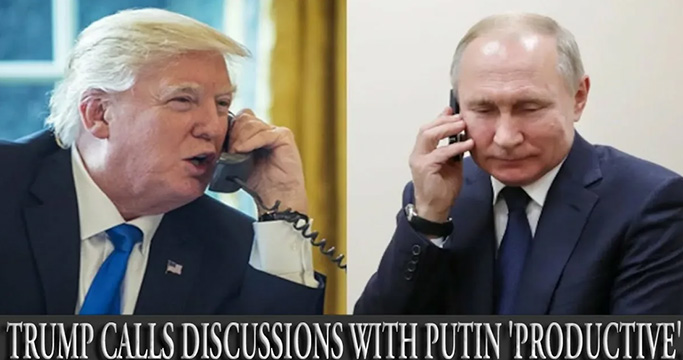
Putin is not one of those bombastic politicians masquerading as statesmen on world stage. He is platinum grade in statecraft and governance — and brilliant in wartime, too. Unsurprisingly, Trump has a sneaking respect towards Putin, unlike towards the Europeans, Gulf sheikhs or the Global South toward whom he has a sneering contempt for their pretences and vanities — and being free riders, notes M.K. Bhadrakumar, Indian Ambassador and prominent international observer.
For both Putin and Trump, the immediate priority is to mend the Russian-American ties which are in Ground Zero. They are lucky in a way because things can only get better. Nonetheless, for both, this translates as putting the Ukraine war on rear view mirror, which demands monumental power of concentration that at times has been stressful, as inherent in any creative process.
Trump combined colossal strength with grit to reach a goal that was uncertain and might still spell doom for the western alliance. The tension increased as he began understanding that Russia’s victory is irreversible. But then, he also pins hopes that it can open a very dramatic relationship between the US and Russia, a first step toward remaking the world order as a concert of three big powers — the US, Russia and China.
For posterity, Trump hopes to remain one of the small group of the most exalted statesmen of this century, who were left to express the tragic experience of humanity with the greatest depth and universal scope. On his part, Putin’s highly cerebral mind instinctively sized up that Trump would be the best American president that Russia would ever have in a long while.
Rubio articulated defensively at a recent Senate hearing: “It’s irresponsible to not have the two biggest nuclear powers on the planet communicating… That doesn’t mean we’re going to be allies or friendly unless conditions change. But we have to at least be able to communicate with them…”
His Russian counterpart Sergey Lavrov responded with a lengthy explanation: “We are naturally sober-minded people in the political sense. It is crucial not to succumb to illusions, to remain realistic and aware that there have been numerous instances where the United States has drastically reversed its stance. Such is life. There is no escaping this reality.
“This factor must be taken into account. We certainly consider it carefully in planning our actions… both sides clearly agreed that the foreign policy of normal countries should be rooted in national interests. This reflects the positions of Trump and Putin. This is not about ideological considerations or attempts to expand influence indiscriminately. This was the central theme of our discussions in Riyadh. In observing current developments, I believe the Trump administration is acting in accordance with this approach.”
This is Putin’s own vision. Make no mistake, on the previous day, at a grand ceremony at the Kremlin’s hallowed St Catherine Hall, Putin bestowed on Lavrov one of Russia’s highest honours – the Order of St Andrew the Apostle the First-Called — praising him in glowing terms.
Curiously, Putin also announced on the same day (May 22) that “a decision has been made to create a buffer security zone along the Russian border. Our Armed Forces are working on this now. They are also effectively suppressing enemy firing points.”
What does Putin’s seemingly innocuous announcement, buried in a lengthy speech regarding the repair and reconstruction of Kursk region, mean? It means that Russia is creating a new war front for Group North comprising the Ukrainian oblasts of Kharkiv, Sumy and Chernihiv!
The front-line will now almost double in length, which will of course hopelessly overstretch the Ukrainian forces and bring Russian heavy armour to the great flat Ukrainian plains on which the expressway runs from Sumy to Kiev without any natural obstacle.
Notably, Putin’s announcement came after his conversation (lasting over two hours) with Trump on May 19. According to Wall Street Journal, Trump later told European leaders for the first time that Putin is not ready to end the war as he believes he is winning.
But Trump did not agree to the demands of Ukrainian Zelenskyy and European leaders to increase pressure on Russia. He told journalists, “This isn’t my war. We got ourselves entangled in something we shouldn’t have been involved in.”
The Europeans got the message alright that it is now up to them to support Ukraine — something they know only too well is beyond their capability. In fact, NATO secretary-general Mark Rutte as much admitted as much in a press conference in Brussels on May 21: “We know that Russia is at an enormous pace reconstituting itself. They are producing at this moment, ammunition at a level which has not been seen in recent decades. They produce four times as much ammunition as the whole of NATO is producing as we speak. They’re reconstituting their armies. Their whole economy is on a war footing.”
Trump has refused to join the European Union’s sanctions pressure on Russia. But this is not defeatism. On the contrary, Trump also stated his intention to focus on economic cooperation with Moscow, which is of immense interest to American business and Wall Street.
Make no mistake, this is not capitulation but a paradigm shift of epochal significance stemming out of a profound foreign-policy strategy rethink on Trump’s part, the credit for which also goes to Putin.
If Trump tactfully ensured through the past 3-month period that the shift in the tectonic plates got a soft landing at home, in Europe and internationally, Putin’s monumental patience contributed to that effort immeasurably by calibrating that Russia’s military victory in Ukraine will also see Trump holding his hand in a ‘win-win’ Entente Cordiale, which in the long term is very much in Russia’s interest.
read more in our Telegram-channel https://t.me/The_International_Affairs

 11:19 26.05.2025 •
11:19 26.05.2025 •






















